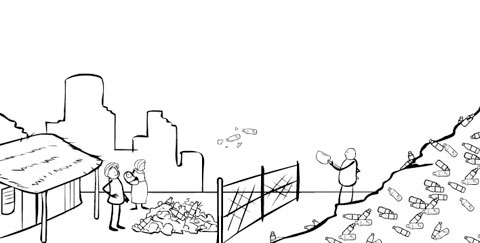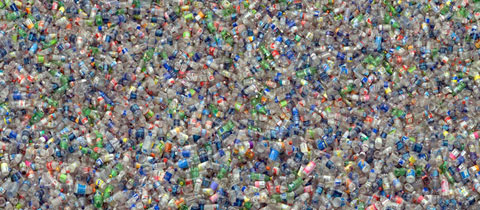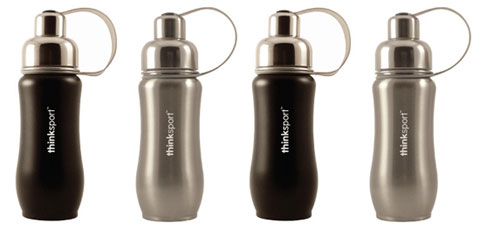5 Facts that will make you lay off the bottle(d water) – for good.
Are you a bottled water addict? Admitting you have a problem is the first step in curing an addiction. It’s time we all take a look at this complicated relationship we have with a completely useless product fueled by manufactured demand. Fortunately, water is free and available to most of us here in the Western World (most of us just take it for granted). Yet, we keep spending our hard-earned money on bottled water. Why?
There are a few myths surrounding bottled water that need to be cleared up as we start on the path toward recovery.
First, it is no cleaner or safer than tap water. The big beverage companies that make millions off our fears of poisoned water would like us to think so; however, according to some recent studies, bottled water is often more contaminated than tap. In fact, federal regulations that govern bottled water require it to be only as good as tap water, not better. There are no regulations or requirements that bottled water be any higher in quality than tap water. Although many areas have problems with water quality, a good filter is always your best bet to get drinking water that is as safe as possible. If we all laid off the plastic bottles, maybe our government could allocate the money currently spent on excessive waste removal (according to A Recycling Revolution Americans use 2,5 million plastic bottles every hour, and most are thrown away) to safeguarding our clean water supply.

Recycling plastic bottles is certainly better than putting them in a landfill, but the reality is it's not so much recycled as downcycled. The process uses a lot of energy and is often not cost-effective. Still image from The Story of Bottled Water.
Second, bottled water does not taste better. Actually, it often looses out to tap water in blind taste tests. 90% of the cost of a bottle of water is in the bottle, lid and label. It is often transported long distances, which emits large amounts of carbon but also seriously affects the quality of the water. According to the website Bottled Water Blues “it is unrealistic to think that water can be bottled in plastic containers, produced at a bottling factory, transported and stored at high temperatures for months at a time and be purer than what a basic home water filtration system can provide. It is impossible to get chemical free water from a plastic bottle.” Storing bottles in warm places like cars and windowsills may actually cause some of the chemicals to leach into the water. Yuck.

Bottled water is often proved to be lower quality than tap, and is subject to far less regulation. Still image from The Story of Bottled Water.
Third, the water in your bottle does not come from the pristine spring depicted on the label. A report released by the Natural Resources Defense Council (NRDC) called “Bottled Water, Pure Drink or Pure Hype?” points out that as much as 40% of all bottled water comes from a city water system, just like tap water. (Why is this scandal not all over the news?) The report also highlights the fact that 60% to 70% of all bottled water sold in the U.S. is exempt from the FDA’s bottled water standards, because the federal standards do not apply to water bottled and sold within the same state. Unless the water is transported across state lines, there are no federal regulations that govern its quality. According to the NRDC, “Bottled water companies have used this loophole to avoid complying with basic health standards, such as those that apply to municipally treated tap water.” Also, all carbonated or sparkling waters are completely exempt from FDA guidelines that set specific limits on contaminants such as E. coli and fecal coliform bacteria, Cryptosporidium and Giardia (pathogens that cause diarrhea and other intestinal problems), or cancer-causing chemicals, such as phthalate. Seems like we’re playing a bit of Russian roulette here.

Our nasty addiction to bottled water created a lot of waste. We don't want to deal with this, so we hide the problem by just shipping the waste off somewere else, for other people to deal with. Unfair. Still image from The Story of Bottled Water.
Fourth, bottled water does not make you look active, cool and healthy. Large corporations like The Clorox Company, PepsiCo and The Coca-Cola Company, none particularly known for their health consciousness, spend millions on advertising to make you think that toting a plastic bottle is somehow signaling to the world that you are devoted to healthy living. What you should do is invest in a good reusable water bottle, and there are enough stylish options out there to match your lifestyle. BPA-free is key, but also make sure it’s good quality, because you don’t want to have to keep replacing one that breaks or gets worn out, then you’d only be creating more waste.
Fifth, you are getting ripped off. Bottled water not only puts unnecessary strain on the environment, it drains your wallet too. Since it’s a dollar here and there it may not be noticeable, but it adds up. Many people complain that water filters are expensive, which is not true, they just cost more per unit, which makes you feel like you’re spending more. With a home water filter you can have guaranteed quality water for about 10 cents a gallon, whereas you pay anywhere from $1 to over $20 a gallon for bottled water, depending on how fancy the packaging is. I don’t know about you, but I’d rather have clean water than a fancy bottle. It’s time to take back the tap, people.

In very few other instances, we could imagine paying thousands of times more for the same thing. Still image from The Story of Bottled Water.
If I can’t convince you it’s time to lay off the bottle, then surely the amazing Annie Leonard can. Watch her 8-minute film The Story of Bottled Water, released on World Water Day.
Top photo: detail of photographer Chris Jordan’s Plastic Bottles from his 2007 series Running the Numbers, depicting two million plastic beverage bottles, the number used in the US every five minutes.
March 24, 2010




Comments